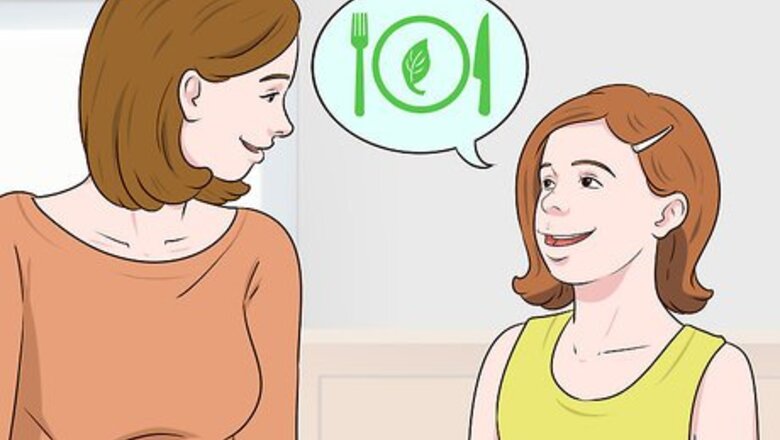
views
Making the Transition
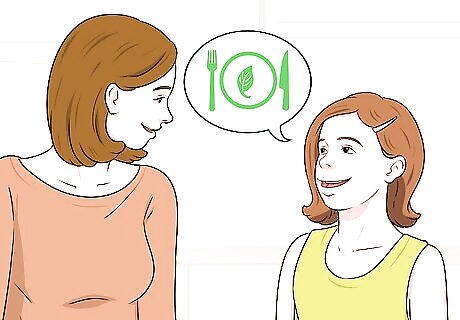
Talk to your parents. If your parents aren't vegetarian, you need to talk to them first. Start by explaining why you want to be vegetarian. They may be resistant at first, but explaining your reasons can be helpful. If they continue to be resistant, focus on the health benefits of vegetarian eating and avoid pressuring them to agree with your beliefs. Pick a good time to talk (when your parents aren't busy). You could say, "Mom and Dad, I've decided I'd like to become a vegetarian. I don't like the idea of eating animals. I think it is mean, and I can't bring myself to do it anymore. Can you help me make this change?" Offer to help prepare your own meals at times. That way, you won't be making extra work for your parents. Don't make your parents feel bad about eating meat.
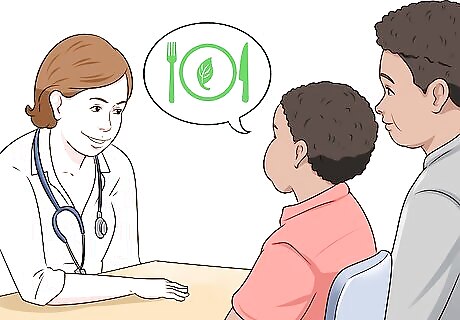
Have a talk with your doctor. Ask your parents if you can talk to your doctor or if they'll do it for you. Your doctor may want to make a few suggestions. For example, they may want you to get on a multivitamin or a few vitamin supplements to make sure you're getting the right vitamins. If you have a health condition, the doctor might have a few suggestions for your diet, too.
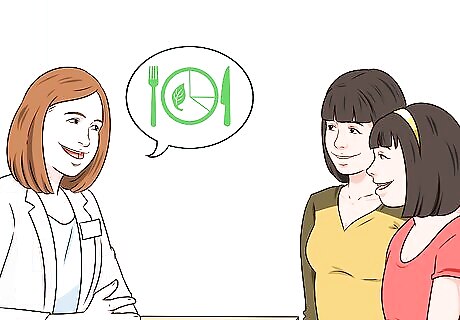
Ask if you can visit a dietician with your parents. A dietician is just someone who studies food and diets. They're good people to talk to when you're trying to become a vegetarian. They'll help you figure out what you need to eat. That way, your body will get the nutrients it needs. It's also a good idea for your parents to be there. They'll be buying the food.
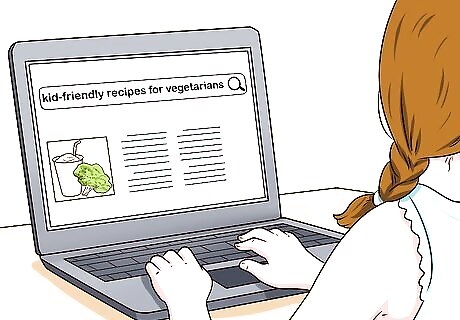
Find recipes you like. You can find kid-friendly recipes for vegetarians. Try looking online for recipes. You can also check out cookbooks from your library. You'll probably need to try some different dishes before finding things you like.
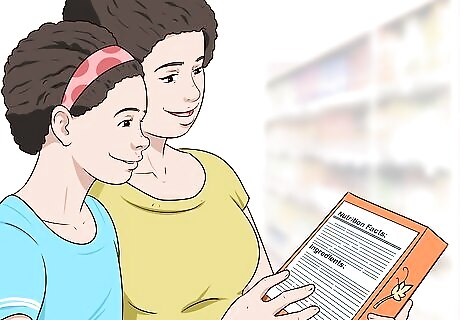
Know what's in your food. Often, meat products can sneak into your food. Restaurants use chicken broth in some foods that may seem vegetarian. It's best to ask if you're not sure. Also, ask your parents to help you read labels. Animal products like rennet, animal fat, and gelatin can be added to products. Some foods will be labelled vegetarian or vegan, making it easier.
Getting the Nutrients Your Body Needs
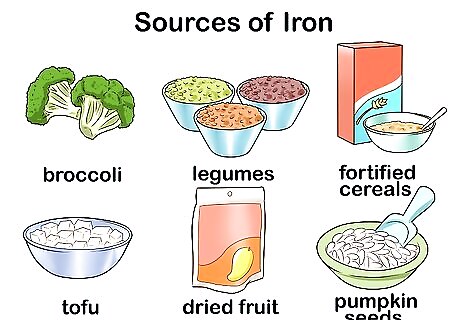
Eat your iron. Iron is important to your body. It helps make red blood cells. Those blood cells move oxygen from your lungs to the rest of your body. If you're cutting meat (a good source of iron), you'll need to add other foods with iron to your diet. Some good sources of iron are broccoli, legumes (lentils, chickpeas, and baked beans), fortified cereals, enriched pasta, soybeans, tofu, dried fruit, and pumpkin seeds. Greens are also iron-rich, such as kale. If you eat these foods with foods high in vitamin C, your body will take in the iron more easily. Foods high in vitamin C include things like oranges, grapefruit, lemons, limes, tomatoes, broccoli, and strawberries. For instance, a good mixture to increase your iron would be a broccoli and chickpea salad with a squeeze of lemon juice. Some people may still need an iron supplement, especially girls who are having their periods.
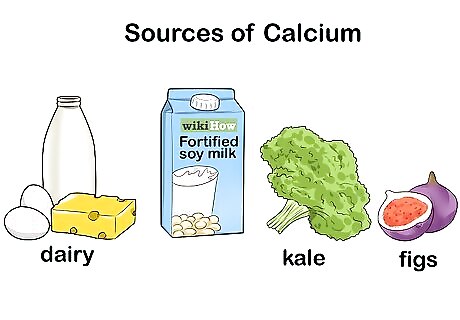
Get your calcium. You may have heard calcium is good for strong bones. That's important when you're growing. You also may have heard that dairy is a great source of calcium. Many vegetarians still eat dairy, and if you are going to, that's one place you can get the calcium you need. You can also get calcium by eating your greens (like kale). Figs are also a good source. Fortified soymilk, tofu, and fortified orange juice have calcium as well. A good meal for getting in some calcium might include sauteed kale tossed with some tofu or feta cheese, if you eat dairy.
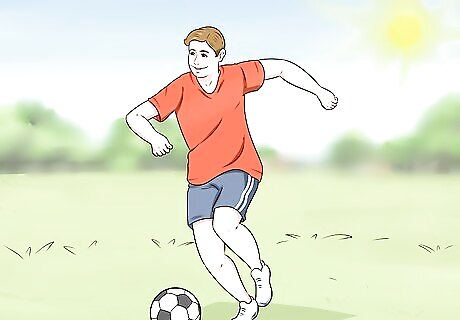
Eat your vitamin D, or take in some sun. Vitamin D helps your body take in the calcium. That means your body can better use it for your bones. Most milk is fortified with this vitamin, and it is often included in fortified soy milk, too. Interestingly, though, this is one area where you're like a plant. You can absorb vitamin D from being in the sun. You don't want to be out so long that you get burned, but just playing outside can be enough for you to get your vitamin D. If you go outdoors to get your vitamin D, only stay in the sun for about 10 minutes. When spending more time in the sun, you need a sunscreen. Talk to your doctor to see if you need a supplement, as well.
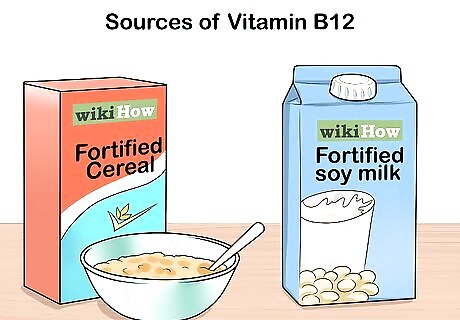
Find sources of vitamin B12. This vitamin helps your body make red blood cells. It also helps your brain work properly. This vitamin is mostly found in meat, so it can be hard to get as a vegetarian. Eggs and dairy (milk, cheese, yogurt, and so on) do have this vitamin if you plan on eating those foods. If not, try fortified cereals, fortified soy milk, or nutritional yeast for this vitamin. You may need to take a supplement to get what you need.
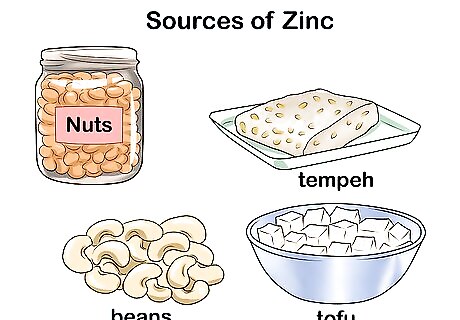
Find sources of zinc. Zinc is very important to your body. It can help keep you from getting sick, and it helps cuts and scratches heal faster. It's also good to also good to help your body make new cells and make the proteins it needs. You can get this vitamin from dairy, but if you're planning on skipping dairy, you'll need to eat foods like beans, nuts, tofu, and tempeh to get your zinc in.
Getting the Proper Servings
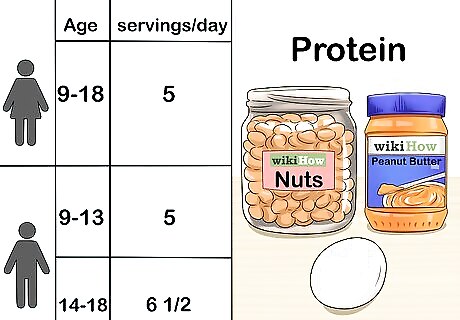
Get enough protein. If you're just becoming a vegetarian, you might think of protein as meat. Protein, though, is found in vegetables, too. How many servings you need depends on how old you are and whether you're a boy or a girl. If you're 4 to 8, you need 4 servings a day. If you are a girl who's 9 to 18, you need 5 servings a day. Boys 9 to 13 also need 5 servings, but if you are 14 to 18 and a boy, you need 6 1/2 servings. For vegetarians, you can eat things like a single egg, tofu, a tablespoon of peanut butter, 1/4 cup of beans, or 1/2 an ounce of nuts. Dairy and soy products are also a great option.
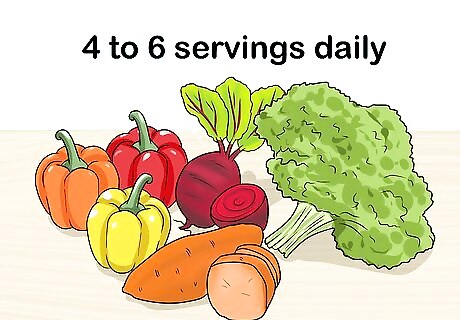
Eat your veggies. As a vegetarian, you're going to be eating a lot of veggies. You'll want to eat at least 4 to 6 servings of veggies a day. Try to get a variety. Eat them in all different colors, from bell peppers and beets to kale and sweet potatoes. One serving of a vegetable is 1 cup of raw or cooked veggies or 2 cups of raw greens.
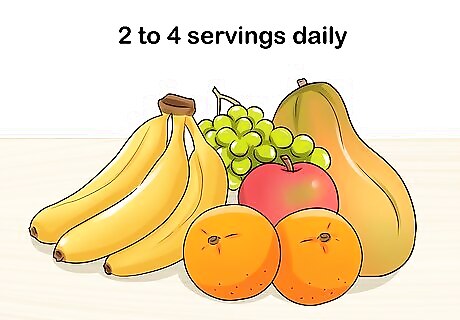
Treat yourself to fruit. Fruit is a great way to get needed nutrients. Plus, they're sweet and yummy. You should be eating at least 2 to 4 servings of fruit a day. You can use fruit as a dessert or eat it on yogurt. One medium-sized piece of fruit is a serving. A 1/2 cup of cut-up fruit is also a serving. If you're eating dried fruit, your serving should be smaller (1/4 cup).
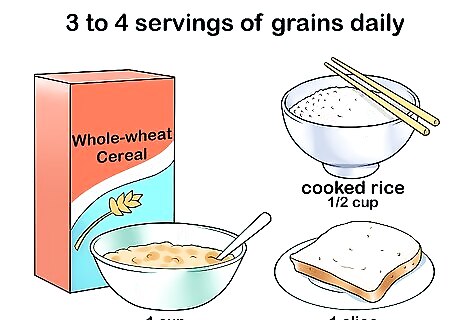
Add some whole grains. Grains help provide some of your energy for the day, and at least half of your grains should be whole grains. Whole grains are good because they have more fiber. You should be eating 3 to 4 servings of grains a day. Servings are 1/2 a cup of cooked pasta or rice, a cup of cereal, 3 cups of popcorn, a tortilla, or a slice of bread. Tell your parents to look for words like "whole-wheat" or "whole-grain" on packages.
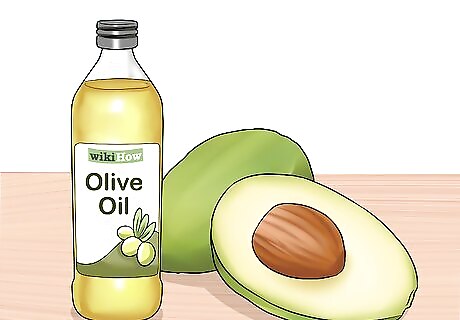
Enjoy healthy vegetable fats. A vegetarian diet may not have enough calories for you if you just eat beans and vegetables. Adding a few healthy fats, like avocados and olive oil, can increase your caloric intake just enough to give you the calories you need.















Comments
0 comment